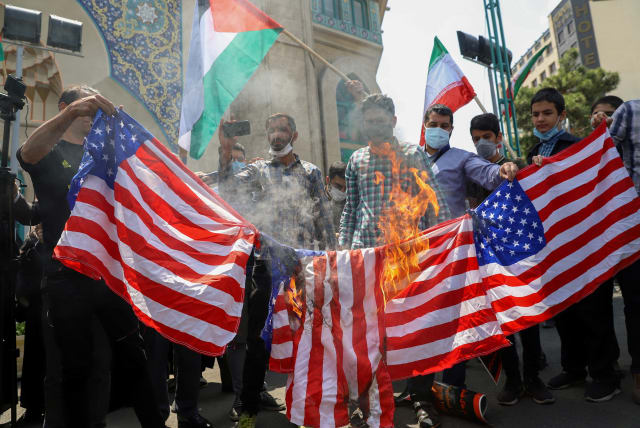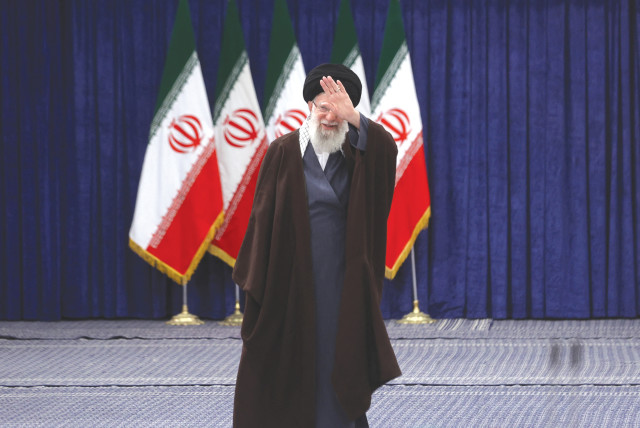Iran as a threat to the US election - opinion

As the 2024 US elections approach on November 5, the specter of Iranian interference looms large, with significant implications for both national and international political landscapes.
The involvement of foreign states in the democratic processes of other nations, particularly through cyber means, has emerged as a significant threat to the integrity of elections worldwide.
The Islamic Republic of Iran, alongside Russia and China, has been frequently highlighted as a key player in such activities, with a particular focus on the United States.
In the dynamic realm of international politics, the integrity of democratic elections remains a cornerstone that is increasingly under threat from sophisticated foreign actors. The Islamic Republic of Iran, with a well-documented history of interference in foreign elections, is a prominent example.
What will Iran's involvement be in the 2024 elections?
This is significant for exploring Iran’s potential involvement in the upcoming 2024 US elections, analyzing past incidents, and projecting future activities to assess the scope and impact of this threat.
Historically, Iran’s regime has shown a capacity for and an interest in engaging in cyber operations aimed at influencing foreign political outcomes.
Iran’s strategic use of cyber operations has been well-documented, particularly during the 2020 US presidential elections.
Iranian actors, masquerading as the far-right group Proud Boys, sent intimidating emails to US voters and falsely claimed ballot fabrication in videos.
They created and disseminated videos falsely claiming ballot fabrication, as part of a broader effort to sow discord and undermine public trust in the electoral process.
For example, CrowdStrike reported that Iranian hackers targeted voter registration databases and accessed sensitive voter information, illustrating the sophisticated nature of Iran’s cyber warfare arsenal.
These activities were not isolated incidents but part of a broader strategy to undermine public confidence in electoral processes and sow discord among the populace.
LOOKING AHEAD to the 2024 US presidential elections, cybersecurity experts from firms like CrowdStrike and Microsoft’s Threat Analysis Center (MTAC) predict an escalation in sophisticated cyber activities by Iran.
These may include advanced information operations using a range of digital content – from memes and GIFS to podcasts and video clips – designed to manipulate public opinion and exacerbate social divisions.
The evolving digital landscape, with its increased reliance on visual media such as memes, GIFs, and video content, offers new modalities for misinformation campaigns.
These campaigns could potentially reach vast audiences across fragmented social media platforms, significantly complicating the challenge of maintaining electoral integrity.
Iran’s approach to cyber influence typically involves a blend of direct and indirect tactics. Direct interventions have included hacking attempts on state and local government networks to access sensitive information, as seen in the 2020 election cycle where Iranian actors successfully penetrated voter registration databases in some states.
Indirect tactics likely to continue into 2024 involve the creation and dissemination of false narratives and deepfake content, leveraging the growing capabilities of generative AI technologies to create hyper-realistic and potentially convincing disinformation campaigns.
Critics have pointed out that many experts associated with reformist (Left-Islamic) ideologies in Farsi-language media, particularly those affiliated with the US government, have echoed Tehran’s narratives under the guise of free speech.
This network poses a significant challenge to countering Iranian propaganda and mitigating its pervasive influence in American sociopolitical spheres.
IRAN’S INFLUENCE in the United States reaches beyond traditional diplomatic channels, deeply embedding itself into media and political lobbying.
This strategic influence is facilitated by Iran’s involvement in various religious centers, educational institutions, media centers, and diverse political lobbies, significantly impacting public perception and policy decisions in ways that could benefit Iran’s geopolitical agenda.
Despite recent leadership changes at institutions like Voice of America, entrenched ideologies continue to support pro-Tehran narratives.
This bias raises concerns about the potential manipulation of public opinion and the shaping of policy in ways that favor Iranian interests.
Additionally, many experts affiliated with reformist (Islamic left) ideologies, particularly in Persian-language media linked to the US government, wield considerable influence. These figures often promote Tehran’s rhetoric under the guise of free speech, inadvertently supporting Iran’s national objectives.
The appointment of Mike Abramowitz as head of Voice of America highlights the ongoing challenges within these media institutions. It remains doubtful that Abramowitz can fundamentally alter the ideologies that govern these outlets, often criticized as a mafia of censorship linked to the US State Department.
The entrenched cliques that amplify the voice and propaganda of the Tehran regime underscore a systemic issue that is frequently overlooked, ostensibly to protect freedom of speech, allowing Iranian influence to persist and potentially expand within the US political and media landscape.
The potential impact of such interventions on the democratic process is profound, threatening not only the factual integrity of election-related information but also public trust in the electoral system itself.
In response, US cybersecurity agencies and private sector entities are ramping up defenses, which include enhancing the security of electoral infrastructure, improving the authentication of digital content, and raising public awareness about the nature and source of cyber threats.
Legislative and technological initiatives are also in place to bolster resilience against these foreign influence operations.
As the 2024 US elections approach on November 5, the specter of Iranian interference looms large, with significant implications for both national and international political landscapes. The ongoing efforts by US authorities to preempt and neutralize these threats are crucial in preserving democratic norms.
However, the multifaceted nature of Iran’s influence operations requires a similarly multifaceted response that combines technology, intelligence, diplomacy, and strategic communication.
This challenge is formidable and necessitates continuous vigilance, innovation, and international cooperation to ensure the integrity of future electoral processes against the sophisticated threats posed by the Iranian mullah’s regime.
The writer is a counterterrorism analyst and Middle East studies researcher based in Washington, with a particular focus on Iran and ethnic conflicts in the region. His newly published book is The Black Shabbat, published in the US. Follow him on X @EQFARD and at erfanfard.com.
Jerusalem Post Store
`; document.getElementById("linkPremium").innerHTML = cont; var divWithLink = document.getElementById("premium-link"); if (divWithLink !== null && divWithLink !== 'undefined') { divWithLink.style.border = "solid 1px #cb0f3e"; divWithLink.style.textAlign = "center"; divWithLink.style.marginBottom = "15px"; divWithLink.style.marginTop = "15px"; divWithLink.style.width = "100%"; divWithLink.style.backgroundColor = "#122952"; divWithLink.style.color = "#ffffff"; divWithLink.style.lineHeight = "1.5"; } } (function (v, i) { });

